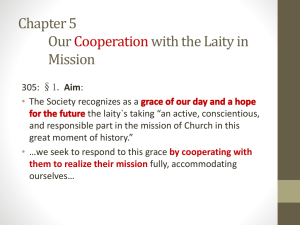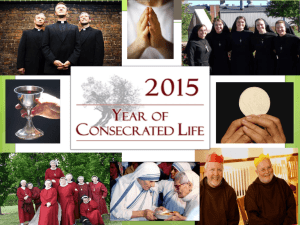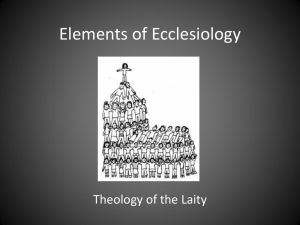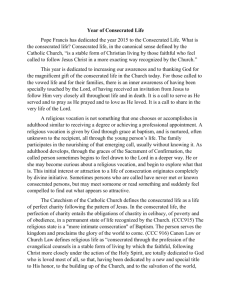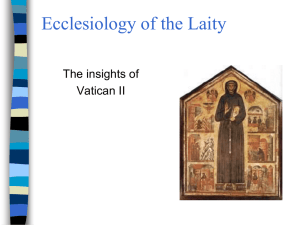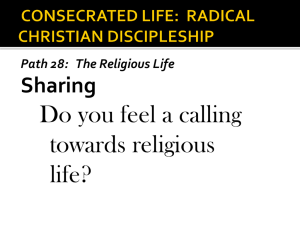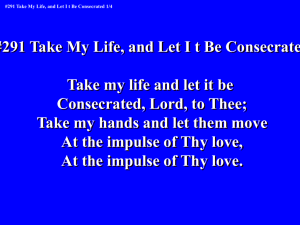ECCL Section 4, Part 2
advertisement
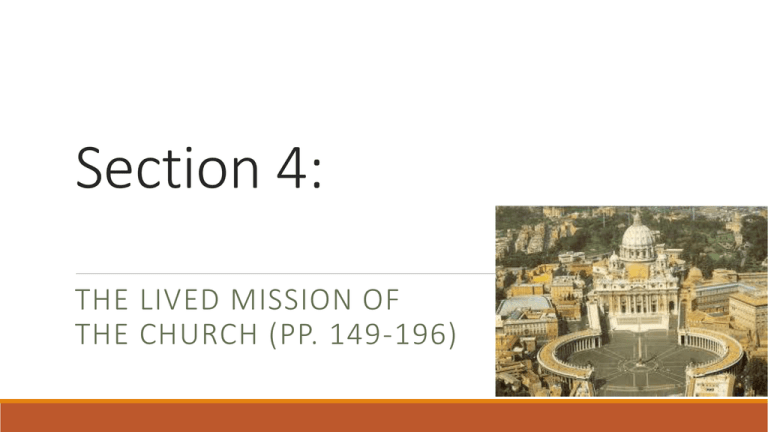
Section 4: THE LIVED MISSION OF THE CHURCH (PP. 149-196) Section 4, Part 2: MANY VOCATIONS TO HOLINESS (PP. 168-185) Introduction (p. 168) •All are called to holiness, not just members of the hierarchy •Do so through the evangelical counsels according to one’s vocation • Poverty, chastity, and obedience •Also through Christ’s three munera or offices—priestly, prophetic, and kingly •Laity—parents in the family or domestic church through Marriage have a unique vocation • Procreation and education of children • Consecrated life—public profession of the counsels and a communal life centered around prayer • Origins in Eastern desert monasticism • New forms of consecrated life—secular institutes and consecrated virgins •5 Articles • • • • • (A. 44) – The Evangelical Counsels (pp. 169-172) (A. 45) – The Mission of the Laity (pp. 172-175) (A. 46) – The Work and Vocation of the Laity (pp. 176-179) (A. 47) – The Consecrated Life: Religious Orders (pp. 179-182) (A. 48) – Other Types of Consecrated Life (pp. 182-184) Article 44: The Evangelical Counsels (pp. 169-172) oDiocesan priests make two vows (a freely made commitment to other persons, the Church, to God): ◦ Celibacy – promise to remain unmarried to devote oneself to the Church and God ◦ Obedience – promise to remain obedient to the local bishop oReligious Order priests make three vows: ◦ Celibacy, Obedience, Poverty (a promise to focus on spiritual riches, rather than earthly wealth) oEvangelical Counsels – A spiritual commitment to live the vows of Poverty, Chastity and Obedience that all are called to make oConsecrated life - A state of life recognized by the Church in which a person publically professes vows of poverty, chastity and obedience Faith Exposed: The Evangelical Counsels https://youtu.be/3mu0xG0-Gek A. 44 cont.: The Evangelical Counsels (pp. 169-172) oPoverty o Jesus told the rich man, “Sell everything, give the money to the poor, then come follow me.” (Mk. 10: 21) o What is meant by Poor in Spirit? o The Evangelical Counsel of Poverty, reminds us to commit to not focus on material wealth but on moderation o Thomas Aquinas said all things are good in moderation o Hard for the rich man to enter heaven (Mt. 19: 23) A. 44 cont.: The Evangelical Counsels (pp. 169-172) oChastity oA healthy integration of sexuality into ones life according to their state in life oA virtue & one of the 7 Gifts of the Holy Spirit o Chaste is positive and means to: o Control ones sexual desires o Understand and use sexual activity to express a love relationship o Even married couples are called to be chaste (sexual fidelity) o Natural Family Planning uses a full awareness of natural biological cycles to time births in a marriage A. 44 cont.: The Evangelical Counsels (pp. 169-172) oAbstinence – any self-restraint, self-denial, or self-control of a desire o All pornography is a violation of chastity o Self control is counter-cultural in a world that preaches YOLO o Consider how Jesus lived, and expected his Apostles to live… o Chastity requires discipleship and leads to respecting self and future vocation o One lives a chaste life when making the vow of celibacy o Celibacy is a unique & positive way of living chastity for diocesan & religious priests o Celibacy is both a sign and a motive of pastoral care; and a sign for the world of the importance of another world (p. 171 shadow box) A. 44 cont.: The Evangelical Counsels (pp. 169-172) oObedience o All Christians are called to obey Christ o Definition of being a disciple o All Catholics also must obey the Magisterium—Vicars of Christ o Bishops have been given divine authority to teach God’s revealed truths o As Americans, it is counter-cultural to fully accept “the truth” from another o Jesus did the same “becoming obedient to the Father, accepting death on a cross.” (Phil. 2: 8) o Consecrated and clerics take as a vow or promise to bishop or superior Homework •Read pp. 172-179 in the e-book for discussion Monday •p. 185; 1-2 •Looking Ahead •HW #11 and Q#11 on Section 4, Part 2 next Wednesday A. 45: The Mission of the Laity (pp. 172-175) •All baptized, non-ordained & non-religious Christians are part of the laity—special role • The clergy’s (hierarchy) primary role is to lead the Church • The laity’s primary role is to witness to God’s love in the world • We are to be Christ’s hands, feet, voice, & ears in sharing the Good News • Unique duty & responsibility since we live in the world • Social, political, economic collaboration with the hierarchy • Think about Drive – 1,000 kids doing something small makes a huge impact • Laity participate in the Priestly, Prophetic, Kingly offices (munera) of Christ A. 45 cont.: The Mission of the Laity (pp. 172-175) The Priestly Office of the Laity • Through our daily spiritual sacrifice, we act as “priests” to live out Baptism & Confirmation • Daily work & prayer, especially Eucharist and Reconciliation • The Ministerial Priesthood • Sacred power for teaching, sanctifying, & governing • The Lay (Royal/Davidic) Priesthood – liturgical & daily roles • Lectoring, EME, serving, music ministry (signing/playing) • Laity and the Culture of Life (The Gospel of Life, JPII – shadow box) • Caring for the weak; teaching NFP; supporting single mothers; encouraging those who care for the sick (doctors/nurses/aids); influencing political and legislative processes; rethinking “labor” and society’s economic policies • Especially prophetic but also priestly & kingly--overlap A. 45 cont.: The Mission of the Laity (pp. 172-175) The Prophetic Office of the Laity • Jesus provides the laity with sensus fedei, a sense of faith • A readiness to accept the true teaching of the Church in faith & morals • A prophet shares God’s word with those that need to hear it (every person in every circumstance) through: • Evangelization—witness & proclamation • Catechists–capable & trained • Catholic views via media, especially social media • Making a Catholic opinion known—even respectfully to hierarchy A. 45 cont.: The Mission of the Laity (pp. 172-175) The Kingly Office of the Laity • The Kingly Office is about choosing what is right / wrong • Self-discipline—begins with self, God, and others • It is being committed to God’s Kingdom now • Living a life of service; caring for those in need • Christ is out example • Exercising leadership roles with integrity & Christian values • Assist in parish governance through committees • Some at higher levels • For us, school, parish, family, work, … Faith Exposed: The Laity & The Christian Mission https://youtu.be/K-roDCs0eas A. 46: The Work & Vocation of the Laity (pp. 176-179) The Work of the Laity • All laypersons are called to live out their faith through their chosen life’s work— participate in Christ’s mission in a unique way • Witness to the Kingdom of God • For students, it is in being the best student they can be • Honest, appreciative, friendly, respectful, spiritual, caring, joyful, … • Witness in chastity and Marriage (Procreative & Exclusive Union) • Civil servants should serve with truth, freedom, solidarity & justice for the common good—special and important role • The work of Consecrated celibates (religious & lay) will be discussed in AA. 47-48 • Lay singlehood is a valid vocation in the Church A. 46 cont.: The Work & Vocation of the Laity (pp. 176-179) The Family: The Domestic Church • A believing family is a “domestic church” • Family is where children first hear about Jesus and God’s word • Christian family’s share sin God’s Trinitarian love, moral living, & prayer • In the early Church, an entire household would be baptized & 1st churches • Parents have a unique & extremely special duty to teach & model a Christian lifestyle to their children • Not only material but also spiritual • Growth in holiness and discernment of vocation • Example of St. Gianna Molla (1922-1962) A. 46 cont.: The Work & Vocation of the Laity (pp. 176-179) Third Orders •Associations of laypeople connected to a particular order in the Church • Practice the Religious Order’s spirituality • Do not take Evangelical vows • Are involved in ministries and outreach of Order • 3rd Order Religious Organizations: • Franciscans, Capuchins, Dominicans, Carmelite • Basilians, Christian Brothers, Maryknoll, … •Consecrated Single Persons—Widows, Virgins, etc… •Unconsecrated Single Persons Homework •Read pp. 179-184 in the e-book for discussion tomorrow •p. 185; 3-5 •Looking ahead •HW #11 and Q#11 on Section 4, Part 2 this Wednesday A. 47: The Consecrated Life: Religious Orders (pp. 179-182) oReligious Orders – Basilian, Franciscan, Capuchin, Jesuit, Benedectine… ◦ Based on the charism of the founder ◦ Public profession of the evangelical counsels as vows = consecrated life ◦ Religious orders are most popular form but not the only one o Religious Orders ◦ Men and women who live in community ◦ Profess a formal, public commitment to live evangelical vows (Poverty, Chastity, Obedience) ◦ Share a liturgical character ◦ Belong to an Institute recognized by the Church Article 47: The Consecrated Life: Religious Orders cont. History of Religious Orders ◦ Monastic – derived from Greek “alone” ◦ Hermits – withdrew from society to the desert to “be” alone with Christ; committed to a life of prayer and solitude ◦ Hermits gradually formed communities—St. Pachomias ◦ These men were eventually called “monks” and “nuns” ◦ These communities eventually were called “Religious Orders” ◦ Members can be both Lay (Brothers & Sisters) and Ordained (Deacons & Priests) ◦ Bishops and pope are special cases ◦ Members follow a common religious “rule”, typically formed by the founder ◦ Catholic Religious Orders must be approved by the Pope A. 47 cont.: The Consecrated Life: Religious Orders (pp. 179-182) Variety of Religious Orders (ROs) ◦ ROs have been formed to respond to needs in the world—Nano Nagle & the Presentation Sisters of the Blessed Virgin Mary ◦ Dominicans – teachers & preachers to combat Albigensianism ◦ Franciscans – restore the Gospel life of simplicity and poverty ◦ Jesuits – missionaries and intellectuals during Catholic Counter Reformation in parishes and schools ◦ Basilians – Run Catholic Schools and priestly training ◦ Christian Brothers (French and Irish)--Schools ◦ ROs were the primary missionaries to foreign lands ◦ Some ROs are devoted to contemplative prayer (Cloister) vs. active apostolates ◦ Benedictines, Carthusians, Cistercians, … A. 47 cont.: The Consecrated Life: Religious Orders (pp. 179-182) Prayer as the Rhythm of Religious Life ◦ Religious life is characterized by prayer ◦ Especially Liturgy of the Hours--The Divine Office ◦ Follow what St. Paul said, “Pray without ceasing” ◦ Morning (Lauds), Mid-day, Noon, Afternoon, Evening (Vespers), Office of Readings, & Compline (7 hours) ◦ The Office focuses on reading the Psalms, New Testament, Writings of Church Fathers & Doctors, Prayers & Response Consecrated Life: Traditional & New Forms https://youtu.be/FYyk10yXeRs https://youtu.be/ade-9pMI32g A. 48: Other Types of Consecrated Life (pp. 182-184) Hermits: The Eremitic Life ◦ Hermits separate themselves (varies)form the world to devote their lives to prayer, penance & purification ◦ Hermits are a witness to the interior aspect of the Church ◦ Their focus is on union with God to symbolize Church’s union with Christ ◦ Their prayer is for the universal Church ◦ St. Anthony is the best known desert father (eremitic) (250 AD) Consecrating a Bride of Christ (shadow box) ◦ Theresa Ivers “married” Christ in a “wedding” ceremony of commitment as a consecrated virgin A. 48 cont.: Other Types of Consecrated Life (pp. 182-184) Consecrated Virgins and Widows ◦ Women who dedicate their state of life as a celibate to be married mystically to Christ for the Kingdom of God ◦ They are formally consecrated by a bishop, but remain active in the world working a secular job ◦ Frequently will be very involved in a parish or volunteer ministry Secular Institutes ◦ Secular communities dedicated to witnessing to the ◦ Gospel (Charitas Christi)--Pope Pius XII in 1947 Societies of Apostolic Life ◦ Lay and clergy who minister, but take promises not public vows (Maryknoll, Oblates of Phillip Neri, SOLT, Paulist) Homework •p. 185; 6-9 •Section 4, Part 2 HW #11 (p. 185; 1-9) due tomorrow •Section 4, Part 2 Q#11 (pp. 168-185; AA 44-48) tomorrow
